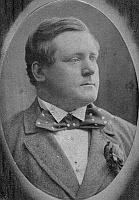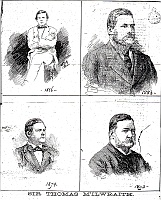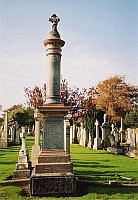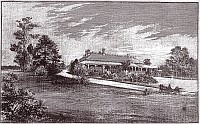The Queensland Caesar - Sir Thomas McIlwraith: by Dr Denver Beanland

For twenty-two years, between 1870 and 1896, Sir Thomas McIlwraith thundered across Queensland’s political stage as a Member of the Queensland Legislative Assembly. He was thrice Premier of Queensland and held various ministerial positions including Colonial Treasurer. He was an engineer, visionary, politician, businessman, entrepreneur, pastoralist and family man.
The publication analyses McIlwraith’s progressive beliefs in economic development, infrastructure, railways, responsible government, nationalism, federation, republicanism and foreign policy, together with indentured labour and race, in colonial Queensland, issues that are as relevant today as they were in the colonial era.
McIlwraith strived to make Queensland the premier colony of Australia. The three times Premier took bold and audacious actions, and had the energy and motivation to drive the colony’s economic development and his own enterprises.
Through McIlwraith we can study the history of the colony of Queensland and chart the trials and tribulations of one of the most significant Scotsmen to come to the Antipodes, one of many who made the British Empire great. The book narrates the history of one of Queensland’s and Australia’s great political figures.
Biographers have neglected McIlwraith although they have written substantial accounts about other colonial leaders, including a full-length biography of Sir Samuel Griffith the other significant colonial figure of the epoch.

Previously an enigma, this biography now illuminates and analyses McIlwraith’s political, business and private life. A proud Scotsman, he inherited his family’s liberal philosophy and became a classical laissez-faire liberal. Apart from Adam Smith the influence of John Stuart Mill is evident in McIlwraith’s beliefs. McIlwraith was not a larger-than-life conservative as portrayed by modern day historians. McIlwraith’s classical laissez-faire liberal philosophy permeated his business and political activities. His liberal beliefs underpinned his continual advocacy for progress.
During study at the University of Glasgow where he gained University prizes in mathematics, McIlwraith witnessed the Industrial Revolution and progress. McIlwraith arrived in Melbourne in 1854 and by the end of the decade became a civil engineer on the Victorian Railways. A pastoralist in Queensland in 1870, McIlwraith was elected to the Queensland Legislative Assembly in that year.
As Premier from 1879, McIlwraith’s policies brought economic development and prosperity to Queensland. He championed Queensland’s growth and development while promoting his own self-interests. He was focused on European settlement and economic development of Queensland with the construction of railways. He established a direct steamship service for mail, freight and immigrants from London to Queensland and his financial skills placed the Colony on a sound financial footing. McIlwraith’s attempted annexation of eastern New Guinea, in April 1883, became the impulse for Australian federation. In mid-1883, he sought the construction of a transcontinental railway from Charleville to the Gulf of Carpentaria, which led to his election defeat.
In 1887, while outside of parliament, McIlwraith again became leader of his party. In 1888, still not a Member of Parliament he led the party to an easy victory in the general election, becoming Premier with the defeat of the Griffith Government. He held the Premiership briefly in 1888 and in 1893 before paralysis on both occasions, diagnosed as peripheral neuritis, led to his resignation as Premier. In 1890, he formed a coalition government with Griffith, his bitterest enemy of the previous decade. Politics, his great passion, deprived him of time for his businesses.
McIlwraith’s investments collapsed with the fall in asset values, following the 1893 bank crash and depression, low wool prices and cattle tick infestation. With his financial affairs in disarray, McIlwraith was paralysed in London when the report into the collapse of the Queensland National Bank was prepared by a committee appointed by parliament. When the report was tabled in parliament, he was accused of a partnership with Edward Drury, the late general manager of the bank.


Although McIlwraith was one of many indebted to the bank with inadequate security it was his alleged partnership as a senior Minister of the government with Drury that became the central issue and not his debt of £251,461. Made the scapegoat for the bank’s insolvency by the government, McIlwraith was seen as an anachronism.
In 1900, McIlwraith died in London and was buried in Ayr, Scotland. He is remembered indirectly by a suburb named after his home Auchenflower, the town of Ayr named after his birthplace, and an obscure mountain range in Cape York Peninsula.
About the author Dr Denver Beanland
Denver Beanland served as a Member of the Queensland Parliament between 1986 and 2001. He was the Attorney-General, Minister for Justice and Minister Responsible for Consumer Affairs from 1996-98 and leader of the parliamentary Liberal Party 1990-91. Between 1976 and 1986, Denver was an Alderman in the Brisbane City Council and in 1985-86 was Vice-Mayor. Denver is a past President of The Royal Historical Society of Queensland and currently serves on the Society’s Council.
Denver holds a Bachelor of Arts with first class Honours in History (2003) and a PhD in History (2008) from The University of Queensland. Previously in 2009, he was commissioned to write and had published A Court Apart: The District Court of Queensland, a history of the Court. Denver is also the author of numerous published articles and delivered many papers at history conferences.